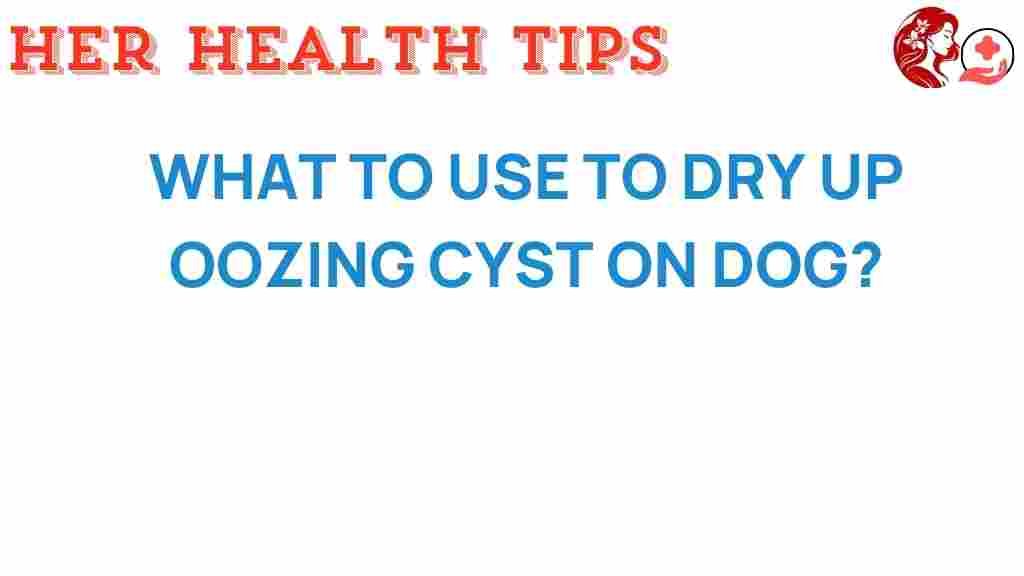Uncovering the Best Remedies to Dry Up Oozing Cysts
As a pet owner, ensuring your dog’s health is your top priority. One common issue that many dogs face is the development of oozing cysts. These skin conditions can be concerning and often require immediate attention. In this article, we will explore effective remedies for managing oozing cysts on dogs, focusing on both home remedies and veterinary advice. We’ll also provide valuable pet owner tips to enhance your dog’s overall wellness.
Understanding Oozing Cysts in Dogs
Oozing cysts are typically benign growths that can occur on a dog’s skin. They may be filled with fluid or pus and can cause discomfort for your pet. Understanding the nature of these cysts is essential for effective treatment.
- Causes: Oozing cysts can be caused by various factors, including infections, blocked hair follicles, or even allergies.
- Symptoms: Look for signs such as swelling, redness, and discharge from the cyst.
- Prevention: Regular grooming and monitoring your dog’s skin can help catch issues early.
Home Remedies for Oozing Cysts
Many pet owners prefer to start with home remedies for managing oozing cysts. These natural treatments can be effective and are often safe for your furry friend.
1. Warm Compress
A warm compress can help reduce inflammation and promote drainage in oozing cysts.
- Soak a clean cloth in warm water.
- Gently apply the compress to the affected area for 10-15 minutes.
- Repeat this process 2-3 times a day until the cyst improves.
2. Aloe Vera Gel
Aloe vera is known for its soothing properties and can aid in the healing process.
- Apply pure aloe vera gel directly onto the cyst.
- Let it sit for about 30 minutes before rinsing off.
- Repeat this twice daily.
3. Coconut Oil
Coconut oil has antibacterial and antifungal properties that can help prevent infection.
- Apply a small amount of organic coconut oil to the cyst.
- Massage it gently to promote absorption.
- Use this remedy once or twice daily.
4. Epsom Salt Soak
An Epsom salt soak can help draw out impurities and reduce swelling.
- Dissolve 1-2 tablespoons of Epsom salt in a bowl of warm water.
- Soak a clean cloth in the solution and apply it to the cyst.
- Leave it on for about 15 minutes, once a day.
Veterinary Advice on Cyst Treatment
While home remedies can be effective, it’s crucial to consult with a veterinarian for proper diagnosis and treatment, especially if the cysts are persistent or worsening.
- Diagnosis: A vet will examine your dog and may perform tests to determine the nature of the cyst.
- Treatment Options: Depending on the diagnosis, your vet may recommend draining the cyst or surgical removal.
- Medications: Antibiotics or anti-inflammatory medication may be prescribed to address infection or pain.
Preventing Oozing Cysts on Your Dog
Prevention is always better than cure. Here are some tips to help prevent the occurrence of oozing cysts:
- Regularly groom your dog to keep their skin healthy and free of debris.
- Monitor your dog’s skin for any unusual lumps or bumps.
- Maintain a healthy diet rich in omega fatty acids to support skin health.
- Ensure your dog is up-to-date on vaccinations and flea/tick treatments.
Troubleshooting Tips for Pet Owners
Sometimes, despite our best efforts, oozing cysts can persist or worsen. Here are some troubleshooting tips:
- If the cyst appears to be growing or changing in color, consult your veterinarian immediately.
- Avoid squeezing or popping the cyst, as this can lead to infection.
- Keep your dog from licking or scratching the area by using an Elizabethan collar if necessary.
When to Seek Veterinary Care
It’s important to know when to seek professional help for your dog’s health. You should consult a veterinarian if:
- The cyst is causing significant discomfort or pain to your dog.
- There is an excessive amount of discharge or bleeding from the cyst.
- Your dog shows signs of fever or lethargy.
Conclusion
Oozing cysts can be a common issue in dog health, but with the right knowledge and care, they can be effectively managed. By utilizing home remedies, staying vigilant about your pet’s skin conditions, and following veterinary advice, you can help ensure your dog remains healthy and happy. Always remember that your veterinarian is your best ally in maintaining your pet’s wellness. For more detailed information on pet care, check out this comprehensive guide on pet health.
As a dedicated pet owner, being proactive about your dog’s health will contribute significantly to their quality of life. Keep these tips in mind, and don’t hesitate to seek professional help when needed. Your furry friend deserves the best care possible.
This article is in the category Conditions and created by HerHealthTips Team
